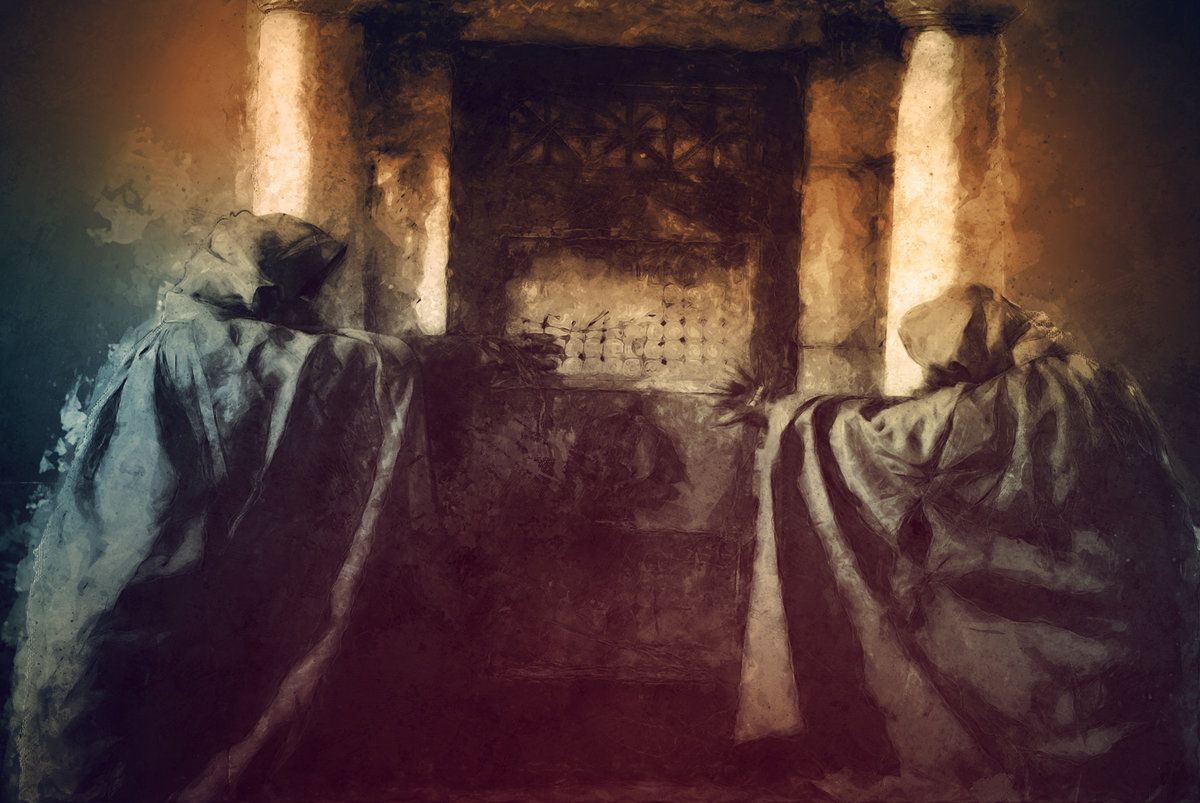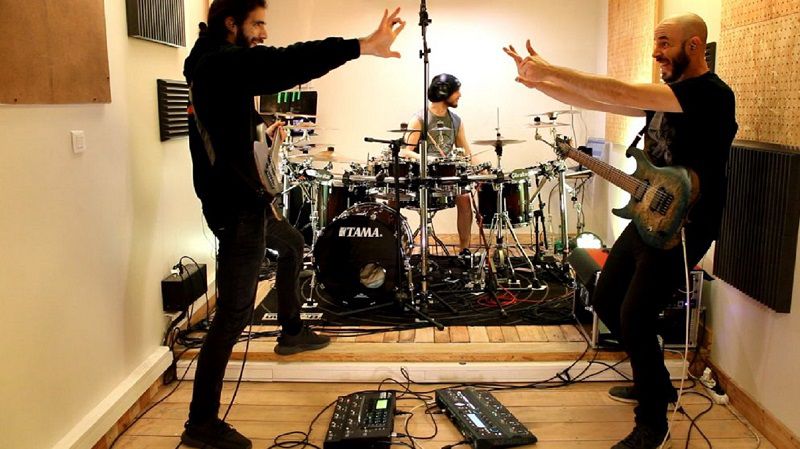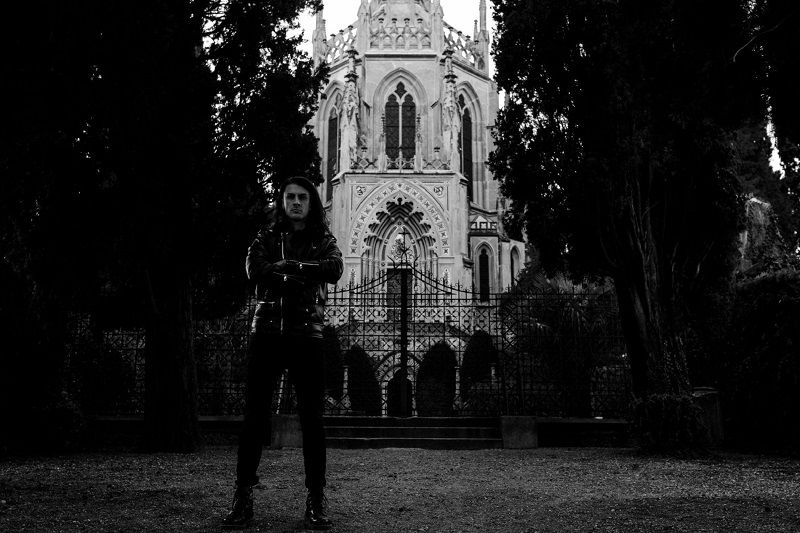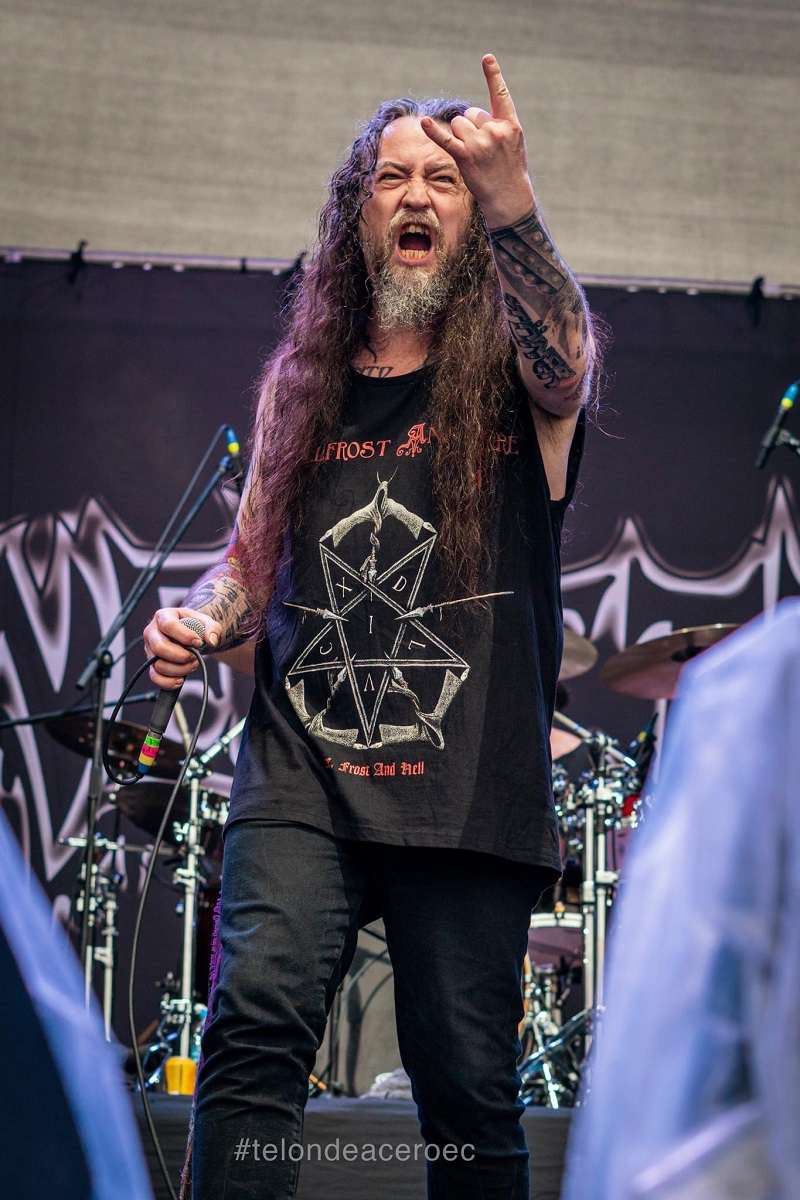Veilburner #Interview
12 min read
Veilburner are a tremendously creative Extreme Metal duo from Pennsylvania, USA. Right at the end of 2018 they released the excellent A Sire to the Ghouls of Lunacy on Transcending Obscurity Records. We spoke to multi-instrumentalist Mephisto Deleterio and vocalist Chrisom Infernium for that release (you can read that here) and now with the excellent follow-up record Lurkers in the Capsule of Skull due out on September 24th I caught up with the band again to hear about the new record and find out how they’ve been doing in these crazy times. Check out what they had to say.
– It’s been a little over a year and half since we last spoke [two and a half actually – I can’t count] and back then it seemed you already had much of Lurkers in the Capsule of Skull finished. What’s been happening for you both in the past 18 months or so?
MD (Mephisto): We just kept writing. The circumstances of the pandemic and lockdown created a good opportunity to be creative. The typical noise and distractions of normal day-to-day life were put on hold for a while, unless you worked on the front lines of the health crisis or a supply chain. In those cases, people’s lives became much more chaotic and stressful, but for the vast majority of us, there was nothing to do but be still. For people fortunate enough to have a creative outlet, it was the perfect opportunity to lose yourself in it. I was just finishing the music for what will be our 7th album when the pandemic began, so I took a few months off to recharge, and then got to work on the music for what will be the 8th album. I finished that in April of this year, just before things began to re-open here.
CI (Chrisom): Basically been doing the normal “existing” thing, which was never normal even before COVID haha. Anyway, now it’s just completely absurd. I’ve been working through the pandemic and also writing as always, trying to keep busy with music and art to keep from going off the rails. Other than that, nothing has really changed.

– Last time you talked a bit about the concept of ‘A Sire to the Ghouls of Lunacy’ and how this new album would be conceptually connected. Based on what you said before I think I have some idea what the title of this album refers to, but maybe you could throw a few clues to our readers about what Lurkers in the Capsule of Skulls is about?
MD: Chrisom is really the mastermind of the concept and thematic onion layers. My understanding of it (at the surface level, anyway), which I think we covered last time, is that the albums concern a man in poor physical health, and this directly affects his mental health. He begins to feel tormented by what may or may not be hallucinations of 2 strange entities (the ones on the cover of “Lurkers…”) who seem to want to either influence or use him to some nefarious end. I ran with that idea when crafting the music for the albums, and came up with ways to relate the music of the albums to each other. I’d encourage listeners to keep their ears open for that, if they’re interested.
CI: These two albums are married to each other, and they intertwine on so many levels. There is a certain way they have been written not only musically but lyrically also. There are little clues and Easter eggs that are weaved between the two of them that creates a rather puzzling yet revealing duality, almost leading you to believe they are one and the same, yet unique in their own ways. You could possibly listen to either album before the other and realise that even though “Sire…” came first it doesn’t necessarily mean “Lurkers…” is the end. There is a method to our madness.
– The sound of the new record is instantly familiar as Veilburner, but there’s a clear progression from A Sire to the Ghouls of Lunacy. How would you say this record differs from the last one?
MD: Musically, I actually approached the writing and recording process to emphasize more similarities between the 2 albums than differences. Since they were intentionally designed to be companion albums from the very beginning, I wanted them to have the exact same “sound” production-wise, as well as certain other characteristics in common that I’m keeping under wraps for now, so that when someone listens to both “Lurkers…” and “Sire…,” they would get at least a subconscious sense that they were listening to 2 individual albums that make up one bigger work. If people get that sense and are interested in delving deeper, there are other things to discover and they might be surprised to find out just how deep that rabbit hole goes.
CI: “Sire…” allowed us to lay a foundation, but we could have written “Lurkers…” first and I think we would still have ended up with what we have now. It’s difficult for me to say they are different because you couldn’t have one without the other. With that being said, there is a distinct difference as far as whose point of view each album is being told from.

– As with any Veilburner release there’s a lot going on in this record. Were there any tracks that you found especially challenging to put together, whether it was a guitar part, or a vocal performance or something about the production?
MD: The song “Para-Opaque” has a very different sound than any song we’ve done before, and I had no instrument preset settings or mixing template to apply to get it to sound like how I was hearing it in my head, so it was a lot of trial, error and fine-tuning to get it close to how it was envisioned, and to make all the instruments play nice with each other in the mix. It’s a pretty odd duck, but I like how it turned out. It’s got a quiet creepiness or dream-like quality to it, and since the song immediately before it and the one immediately after it are so up-tempo and aggressive, it’s a good place to put this song because it keeps the listener from getting ear fatigue from too much of the same thing for too long.
CI: Lyrically, Nocturnal Gold was probably the one for me. It had to be performed just right and I tried to approach it like a pop song or something akin to stadium rock, like Queen or Thin Lizzy.
– The guitar sound you have is one of the band’s most recognisable features I think. How do you get that distinctive sound?
MD: All guitars are tracked through virtual amp and cabinet modelling software (Amplitube 2). That, in and of itself, isn’t anything special, but I like to take a mad scientist approach to effects, or picking/plucking the strings in weird ways to get a certain attack, or how I engage the tremolo bar when plucking or strumming melodies sometimes. I had a lot of fun over the years experimenting with unorthodox software effects processors, and I’m lucky enough to have found one several years ago that a company made available for a short time and then pulled from the market for some reason. It puts any analog signal through a series of deeply transformative signal processing algorithms, much more than just your standard guitar FX processors do. It has a few hundred presets that mix up the types and combinations of signal processors, and then give the user control over how they are tweaked and set. It can make a guitar track, vocal track, or any other recorded instrument sound like nothing you’ve ever heard, almost as if you’re listening to a synthesizer. The beauty is that unlike a synthesizer, it does not trigger from a keyboard or other midi input device. It just works with the live or recorded sound that you feed into it. I’ve used this plug-in in combination with Amplitube over the years to make some really cool accent guitar, lead guitar and vocal effects that I’ve saved to custom presets to use exclusively for this project. Sometimes I’ll put the guitar track I’m working with on 2 seperate tracks, and apply the normal amp and cabinet modelling to one of them, and something from this other effects processor on the other track and blend them together in the mix. I think some people would be surprised to find out that many of the sound layers they hear on our albums are actually guitars or vocals fed through this very special and unique signal processor and not a keyboard, synthesizer or guitar synth. I have this software processor and my presets backed-up in multiple locations because I’m scared to death of losing it since it’s no longer available, and I really wouldn’t know how to get another copy if I lost mine or it got corrupted. It’s become kind of my secret ingredient.
– Chrisom, you spoke last time about some of your vocal influences. Was there anything different you tried out this time in terms of style or vocal delivery?
CI: I always try and expand on what I’m already doing, but I also need to make sure it comes across as being organic and not forced. There wasn’t anything that was out of the ordinary other than trying to make some of the vocals sound harsher and more bitter.
– Have there been any notable new inspirations that made a mark on the latest record?
MD: Another journalist friend of ours, John Norby, is an independent filmmaker in Ireland (Scalp Mountain Productions). I was working on this album when he notified us of an experimental sci-fi film he had completed called Assimilation, and for which he had uploaded a trailer to Youtube. He wanted us to check it out, and when I watched it, the imagery and overall vibe gave me music ideas. I had also just recently seen Blade Runner 2049 in the theater at around the same time, and I was blown away by the soundtrack and looking to use that influence in an intro somewhere. Those 2 influences got incorporated into the song that became “Cursed, Disfigured, Amen!” I actually got to see the whole Assimilation movie a year later when John came to the U.S. to screen it at a film festival in New York City. It was very interesting, and right up my alley because I love strange and unorthodox films.
CI: It’s been awhile since this album was recorded, but I remember listening to a lot of Trepaneringsritualen. It really took hold of me, and I think I carry some of that into album six also. Dodecahedron’s “Kwintessens” album really stuck to me also. It really sucks that Michiel passed away, because I believe their best music was yet to come, which for me is huge because that album is phenomenal. I think I was inspired as much by his vocal approach as I was by Daniel from Marduk. I always sort of gravitated to that style, but never quite to the extent as it is on “Lurkers…” It was always restrained in a sense, but I felt like it needed to be restrained in our prior works. This album called for absolute nastiness, and I’m hoping I delivered.

– I never asked last time how the two of you first got together to make music. What do you remember about that initial collaboration and how has your partnership evolved over the years?
MD: We’ve actually known each other for 20 years, but didn’t work with each other until 2013. We were in seperate bands that practiced on the same farm, and everyone in the bands that practiced there got to know each other (A farmer in Lancaster, PA got the very lucrative idea to convert one of his old chicken coops into a bunch of sound-proofed rehearsal spaces for bands to rent, and the whole place was like a band hotel). When my old band dissolved, my old bass player and drummer started a new project with Chrisom, and at one point a few years later they were looking to make a demo. Since they knew I was learning sound production and getting into the home studio thing, they contacted me to see if I would produce and engineer it. During one of the vocal tracking sessions, I mentioned to him that I had a lot of music sitting around that I wrote after my old band broke-up, but that I’ve never had a knack for writing lyrics or doing vocals. He was interested in hearing it, so I sent him some of the songs. He loved what he heard and it was giving him ideas, so he fleshed those songs out and then I sent him some more. A year later, we released that material as our first album, “The Three Lightbearers.” It was a very smooth and fluid working relationship, with no drama, complications, or headaches. We both wanted to build on it, keep the momentum going, and just keep things as easy-going and laid back as we could. We just kept writing and recording after that. It’s been 8 years and we haven’t stopped writing and recording since.
CI: I had always wanted to do something with him but it was never able to materialise. For me, I think it’s best that it hadn’t happened until then, because I don’t think I was in the right place spiritually and philosophically when I was younger in order to properly compliment what he had written musically. Everything happens for a reason they say, and well…here we are.
– Thanks for taking the time again to answer some questions. I loved the last album and you’ve definitely kept the bar high with this new one. Is there anything else you’d like to mention or promote to our readers?
MD: We’ve recently agreed to extend our relationship with Transcending Obscurity for 2 more albums, with the possibility of a 3rd. We love working with Kunal because he’s so passionate, driven and hard-working, and we love the products, merchandise options and quality that he puts into his releases. Since we’ve already written and recorded the music for the next 3 albums, as well as the vocals for the next 2, we’re breathing very easy these days knowing that we have so much of our future output lined up in the queue and ready to go when Kunal wants it. After writing an album per year for the past 8 years, I’ve told myself that I’m going to take this year off and focus on some other things for a change. It’s a little frustrating being so far ahead and knowing that the music we’re writing now won’t be heard for several years, and I’m concerned that if I just keep writing on autopilot, the music will start to sound very “samey” and uninspired,” so I’ll pull back for a little while for the benefit of everything. Thank you for the interview, and allowing us the chance to catch up.
CI: Thank you for wanting to speak to us. I would like to mention that this concept (for the two albums) is/was my passion project. Back in 2017, mental health in my family was a real crisis that was kept in the dark, tucked away like some pseudo-illness that most people never want to get help for because of the stigma that comes along with it all. It’s equally as bad to me as the Covid-19 crisis, if not worse, because not only do you need to worry about your physical health due to a pandemic, but it directly correlates with your mental health also. People are so stressed, anxious and fearful of what tomorrow will hold for them, and when you couple this with a global health crisis it’s a formula for disaster. I am fortunate that I do not suffer from mental illness of any kind, but I try to understand it even if there’s no way of understanding. I hope these two albums show the listeners and anyone who takes interest in them that there are people who will listen and who want to help, and if these records have an impact on just one person affected by depression or any mental illness then I accomplished what I set out to do.
Interview by Tom Boatman
Thanks again (again) to Mephisto and Chrisom for their time. Lurkers in the Capsule of Skull will be released on Transcending Obscurity Records on September 24th. You can pre-order the album on all manner of cool formats. Check them out on the label’s links below. Follow the band on social media to stay up to date with future releases. You can be sure there’ll be more to come from the duo. Expect it to be great.
Label
Site
Facebook
Bandcamp
Instagram
Twitter
YouTube
Store EU
Store US
**Please support the underground! It’s vital to the future of our genre.**
#WeAreBlessedAltarZine
#TheZineSupportingTheUnderground



